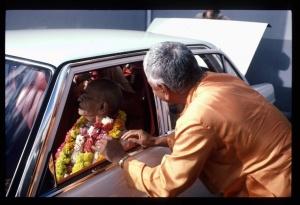CC Madhya 8.215: Difference between revisions
m (1 revision(s)) |
No edit summary |
||
| Line 1: | Line 1: | ||
{{ | [[Category:Sri Caitanya-caritamrta - Madhya-lila Chapter 08|C215]] | ||
<div style="float:left">'''[[Sri Caitanya-caritamrta|Śrī Caitanya-caritāmṛta]] - [[CC Madhya|Madhya-līlā]] - [[CC Madhya 8|Chapter 8: Talks Between Śrī Caitanya Mahāprabhu and Rāmānanda Rāya]]'''</div> | |||
<div style="float:right">[[File:Go-previous.png|link=CC Madhya 8.214|Madhya-līlā 8.214]] '''[[CC Madhya 8.214|Madhya-līlā 8.214]] - [[CC Madhya 8.216|Madhya-līlā 8.216]]''' [[File:Go-next.png|link=CC Madhya 8.216|Madhya-līlā 8.216]]</div> | |||
{{CompareVersions|CC|Madhya 8.215|CC 1975|CC 1996}} | |||
{{RandomImage}} | |||
==== TEXT 215 ==== | ==== TEXT 215 ==== | ||
<div | <div class="verse"> | ||
sahaja gopīra prema,—nahe prākṛta kāma | :sahaja gopīra prema,—nahe prākṛta kāma | ||
kāma-krīḍā-sāmye tāra kahi ‘kāma’-nāma | :kāma-krīḍā-sāmye tāra kahi ‘kāma’-nāma | ||
</div> | </div> | ||
| Line 12: | Line 16: | ||
==== SYNONYMS ==== | ==== SYNONYMS ==== | ||
<div | <div class="synonyms"> | ||
''sahaja''—natural; ''gopīra''—of the ''gopīs''; ''prema''—love of Godhead; ''nahe''—is not; ''prākṛta''—material; ''kāma''—lust; ''kāma-krīḍā''—lusty affairs; ''sāmye''—in appearing equal to; ''tāra''—of such activities; ''kahi''—I speak; ''kāma-nāma''—the name “lust.” | |||
</div> | </div> | ||
| Line 19: | Line 23: | ||
==== TRANSLATION ==== | ==== TRANSLATION ==== | ||
<div | <div class="translation"> | ||
“It is to be noted that the natural characteristic of the gopīs is to love the Supreme Lord. Their lusty desire is not to be compared to material lust. Nonetheless, because their desire sometimes appears to resemble material lust, their transcendental love for Kṛṣṇa is sometimes described as lust. | “It is to be noted that the natural characteristic of the gopīs is to love the Supreme Lord. Their lusty desire is not to be compared to material lust. Nonetheless, because their desire sometimes appears to resemble material lust, their transcendental love for Kṛṣṇa is sometimes described as lust. | ||
</div> | </div> | ||
| Line 26: | Line 30: | ||
==== PURPORT ==== | ==== PURPORT ==== | ||
<div | <div class="purport"> | ||
Bhaktisiddhānta Sarasvatī Ṭhākura says that material lust should never be attributed to Kṛṣṇa, who is full of transcendental knowledge. Material lust cannot be engaged in the service of the Lord, for it is applicable to materialists, not to Kṛṣṇa. Only prema, or love of Godhead, is applicable for the satisfaction of Kṛṣṇa. Prema is full service rendered unto the Lord. The lusty affairs of the gopīs actually constitute the topmost love of Godhead because the gopīs never act for their own personal satisfaction. They are simply pleased by engaging other gopīs in the service of the Lord. The gopīs derive more transcendental pleasure from indirectly engaging other gopīs in the service of Kṛṣṇa than from engaging in His service themselves. That is the difference between material lust and love of Godhead. Lust applies to the material world, and love of Godhead applies only to Kṛṣṇa. | Bhaktisiddhānta Sarasvatī Ṭhākura says that material lust should never be attributed to Kṛṣṇa, who is full of transcendental knowledge. Material lust cannot be engaged in the service of the Lord, for it is applicable to materialists, not to Kṛṣṇa. Only prema, or love of Godhead, is applicable for the satisfaction of Kṛṣṇa. Prema is full service rendered unto the Lord. The lusty affairs of the ''gopīs'' actually constitute the topmost love of Godhead because the ''gopīs'' never act for their own personal satisfaction. They are simply pleased by engaging other ''gopīs'' in the service of the Lord. The ''gopīs'' derive more transcendental pleasure from indirectly engaging other ''gopīs'' in the service of Kṛṣṇa than from engaging in His service themselves. That is the difference between material lust and love of Godhead. Lust applies to the material world, and love of Godhead applies only to Kṛṣṇa. | ||
</div> | </div> | ||
__NOTOC__ | |||
<div style="float:right; clear:both;">[[File:Go-previous.png|link=CC Madhya 8.214|Madhya-līlā 8.214]] '''[[CC Madhya 8.214|Madhya-līlā 8.214]] - [[CC Madhya 8.216|Madhya-līlā 8.216]]''' [[File:Go-next.png|link=CC Madhya 8.216|Madhya-līlā 8.216]]</div> | |||
__NOTOC__ | |||
__NOEDITSECTION__ | |||
Revision as of 14:25, 19 August 2021

A.C. Bhaktivedanta Swami Prabhupada
TEXT 215
- sahaja gopīra prema,—nahe prākṛta kāma
- kāma-krīḍā-sāmye tāra kahi ‘kāma’-nāma
SYNONYMS
sahaja—natural; gopīra—of the gopīs; prema—love of Godhead; nahe—is not; prākṛta—material; kāma—lust; kāma-krīḍā—lusty affairs; sāmye—in appearing equal to; tāra—of such activities; kahi—I speak; kāma-nāma—the name “lust.”
TRANSLATION
“It is to be noted that the natural characteristic of the gopīs is to love the Supreme Lord. Their lusty desire is not to be compared to material lust. Nonetheless, because their desire sometimes appears to resemble material lust, their transcendental love for Kṛṣṇa is sometimes described as lust.
PURPORT
Bhaktisiddhānta Sarasvatī Ṭhākura says that material lust should never be attributed to Kṛṣṇa, who is full of transcendental knowledge. Material lust cannot be engaged in the service of the Lord, for it is applicable to materialists, not to Kṛṣṇa. Only prema, or love of Godhead, is applicable for the satisfaction of Kṛṣṇa. Prema is full service rendered unto the Lord. The lusty affairs of the gopīs actually constitute the topmost love of Godhead because the gopīs never act for their own personal satisfaction. They are simply pleased by engaging other gopīs in the service of the Lord. The gopīs derive more transcendental pleasure from indirectly engaging other gopīs in the service of Kṛṣṇa than from engaging in His service themselves. That is the difference between material lust and love of Godhead. Lust applies to the material world, and love of Godhead applies only to Kṛṣṇa.